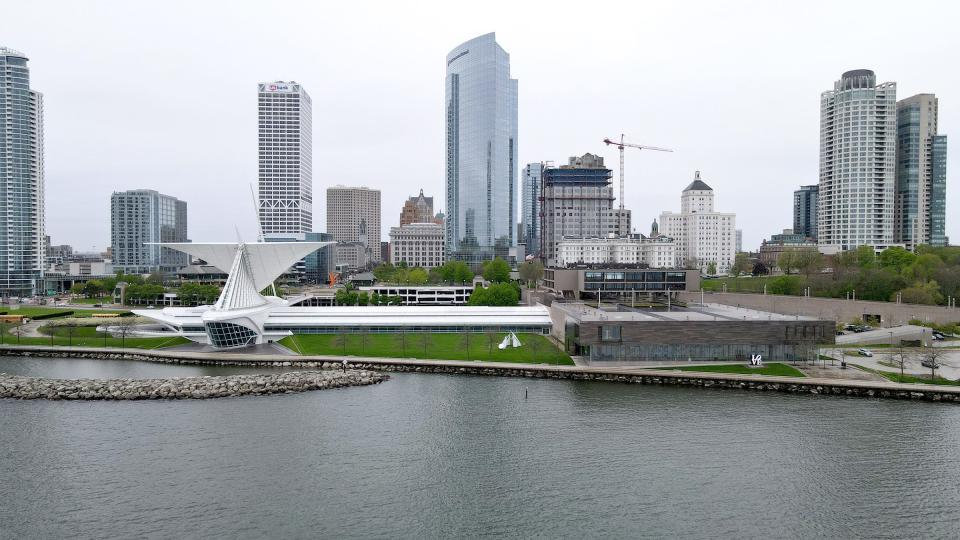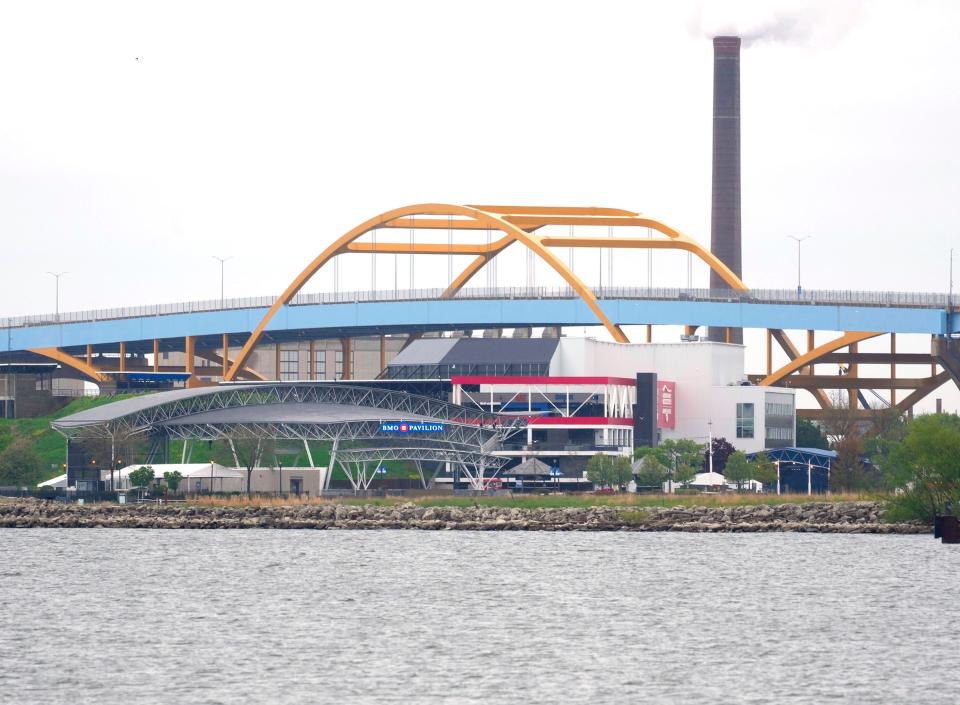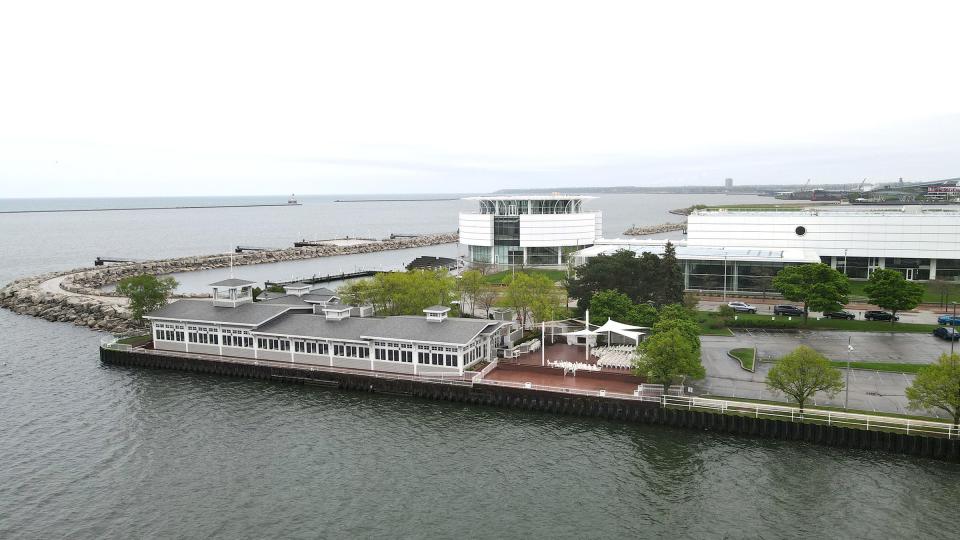Climate change brings rising Lake Michigan water levels. Art Museum, Summerfest, others respond
As climate change brings rising levels for Lake Michigan, operators of Milwaukee lakefront attractions such as the Milwaukee Art Museum, Discovery World and Summerfest are working to protect those properties.
That includes a new flood mitigation project at the War Memorial Center that's costing Milwaukee County taxpayers more than $600,000.
Meanwhile, the county is studying the effects of increased coastal erosion − another climate change consequence − at more than a dozen lakefront parks.
That comes as the Milwaukee Journal Sentinel recently reported American Family Field's soaring insurance premium due to a possible flood risk.
Here's what to know.
Lake levels fluctuate ― with climate change bringing big swings
Runoff and precipitation add water to Lake Michigan, with evaporation and diversions removing water. Climate change has affected those factors.
That includes a 17% increase in precipitation throughout Wisconsin since 1950 − with the biggest increase occurring in the state's southeastern portion. That's according to a 2021 report from the Wisconsin Initiative on Climate Change Impacts, a project of the University of Wisconsin-Madison's Nelson Institute for Environmental Studies and the Wisconsin Department of Natural Resources
That's led to more dramatic water level changes on the Great Lakes over the past two decades, reaching historic highs and lows within a few years. Those large swings change where waves break − which accelerates shoreline deterioration.
Along with those big fluctuations, there will likely be an overall long-term increase in Lake Michigan's water levels, according to a peer-reviewed University of Michigan study published in 2022.
Increased lake levels bring challenges
Long-term increases in Great Lakes water levels will bring some big challenges.
"Like sea level rise, higher lake levels can increase coastal erosion, change navigation considerations and increase the risk of coastal flooding," according to a 2022 article published by the American Geophysical Union.
"Storms and flooding associated with recent record highs have already caused problems for people, infrastructure and environments.
"Higher lake levels mean that storms, flooding events and natural variability will have more extreme impacts on the lake shores, and coastal decision makers will have to adapt to higher lake levels in the coming years," the article said.
War Memorial Center responds with $605,000 project

Climate change is leading the county-owned War Memorial Center to do a $605,880 flood mitigation project.
The project, outlined in a recent building permit application, features a sewer decoupling, pumps and a lift station. It's a response to record high lake levels in 2019 and 2020, said Erica Goblet, a Milwaukee County project manager.
A storm sewer in 2020 backed up during a storm and flooded storage rooms and switch gear rooms, according to a county report.
A large flood could affect the adjacent Milwaukee Art Museum's vault, "which houses irreplaceable works of art valued at approximately $800 million," the report said.
It also could affect the the main power supply and backup generator for both the memorial center and art museum, it said. An extended power loss could cause significant damage to the museum’s collection, which needs temperature and humidity controls.
Milwaukee Art Museum takes steps to prevent flooding
The Milwaukee Art Museum works with Milwaukee County to prepare for possible flood risks, said Lindsey Wurz, museum communications manager.
"If there is a flood, the museum has preventatives installed throughout the campus and water sensors placed at key locations to notify staff in a timely manner, allowing for prompt action," Wurz said.
"We do not see this as an immediate concern and will continue collaborating with the county to take preventative steps − such as this (War Memorial Center) project − to protect the invaluable collection," she said.
Summerfest, Discovery World monitoring lake levels

Executives at Milwaukee World Festival Inc., which operates Summerfest, and Discovery World also are monitoring Lake Michigan's higher levels.
Milwaukee World Festival completed flood mitigation projects in response to record high water levels in 2019, said Julie Dieckelman, Summerfest media representative.
"We are actively watching water level trends and considering record water levels with any construction project," Dieckelman said.
Discovery World installed flood panels "that effectively protected our lowest point from water intrusion" after high lake levels in 2018, said Carl Schoettel, chief operations officer.
"If need be, we can increase the effective coverage of the area due to future storms or rising lake levels," Schoettel said. "For us, it’s all about following the science."
Also, Discovery World in 2020 deployed a temporary rubber water barrier to prevent damage during a winter storm that struck the lakefront. The storm caused heavy damage to the Port of Milwaukee, which includes the science and technology museum.
A representative of Bartolotta Restaurant Group, which operates Harbor House restaurant next to Discovery World, declined to comment.

Milwaukee County lakefront parks also affected
The Milwaukee County Parks Department has considered climate change and "projected future rainfall and lake levels" when planning beach, breakwater and shoreline protection projects along Lake Michigan, Goblet said.
That includes improvements at South Shore Park, McKinley Park and the North Point parking lot next to Bradford Beach.
Also, the county is developing a plan to address bluff erosion on parkland along the Lake Michigan shore. Increased coastal erosion is one of the long-term risks from rising water levels cited by the American Geophysical Union.
The plan will focus on stabilizing bluffs to prevent further erosion, improve public safety, protect natural habitats, and prevent loss of parkland. The study, costing $232,218, is funded through money the county received from the federal American Rescue Plan Act, and is to be completed by February.
The subjects are Bay View Park, Bender Park, Big Bay Park, Bradford Beach and McKinley Park, Cupertino Park, Doctors Park, Grant Park, Lake Park/Linnwood Revetment, Sheridan Park, South Shore Park, Veterans Park and Warnimont Park.
Meanwhile, the county Parks Department recently completed a separate $30,000 study of how Grant Park, in South Milwaukee, might handle climate change. That includes winning "resilience grants" to pay for such projects as building wide beaches with native plants to reduce coastal erosion.
Caitlin Looby of the Journal Sentinel staff contributed to this report.
Tom Daykin can be emailed at tdaykin@jrn.com and followed on Instagram, X and Facebook.
Subscribe to get the BusinessWatch email newsletter.
This article originally appeared on Milwaukee Journal Sentinel: Climate change brings flood concern for Art Museum, Summerfest, others


